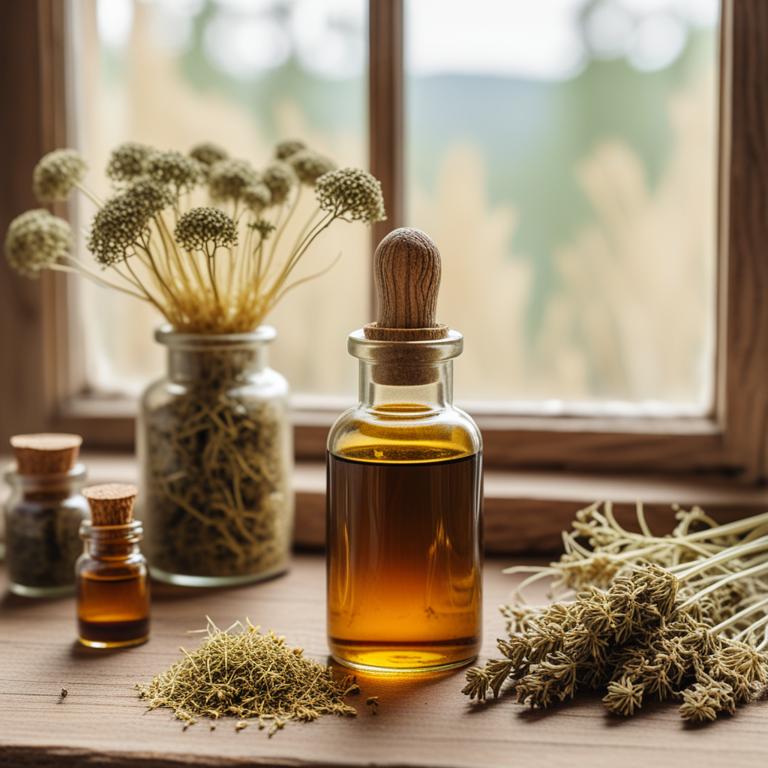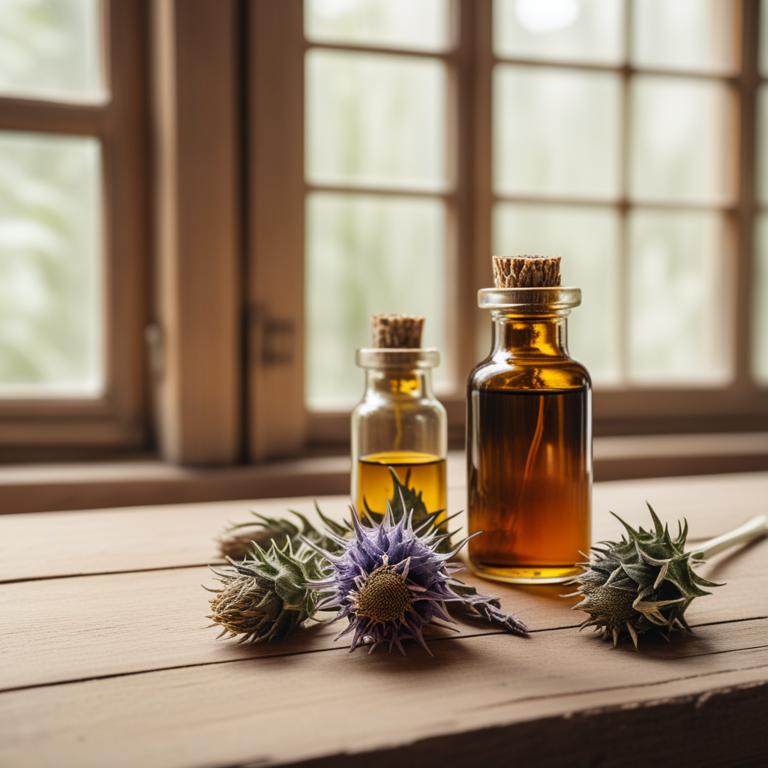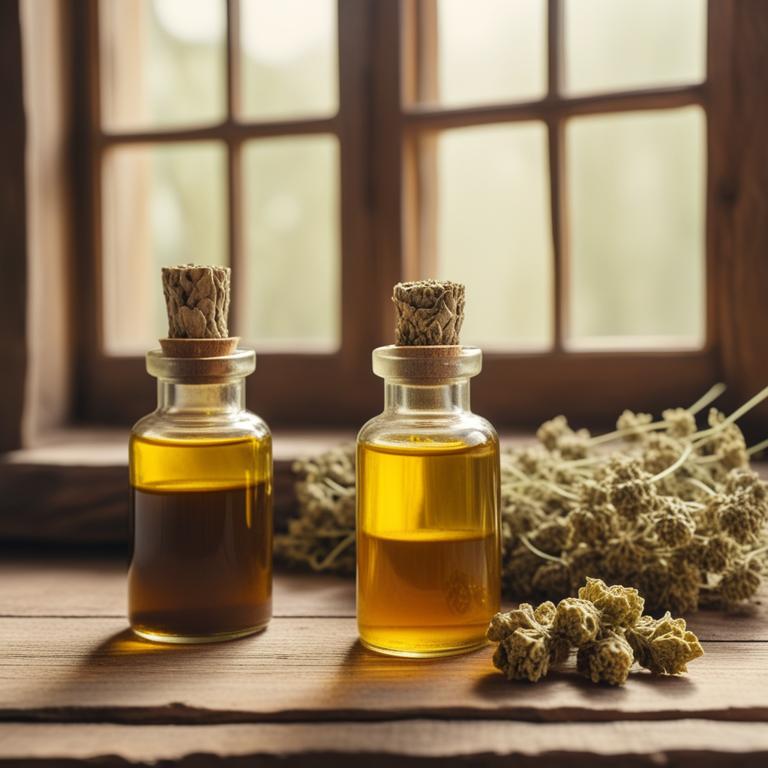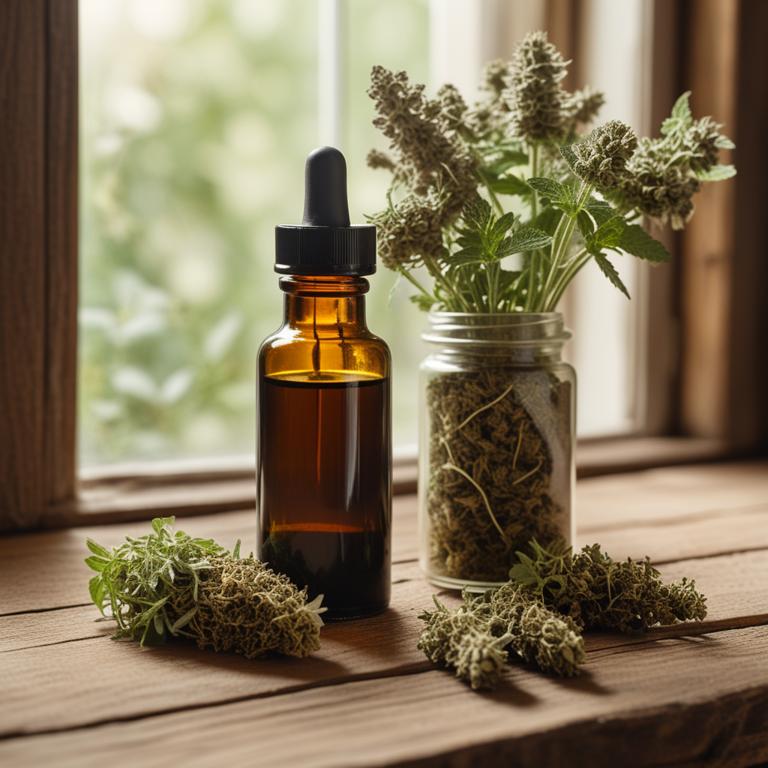7 Best Herbal Tinctures For Stomach Discomfort

Herbal tinctures for Stomach discomfort are liquid extracts made from plants and herbs that have been used for centuries to alleviate digestive issues, nausea, and stomach cramps.
These tinctures work by stimulating digestion, reducing inflammation, and soothing the stomach lining, providing relief from symptoms such as bloating, gas, and heartburn.
Popular herbal tinctures for stomach discomfort include peppermint, which eases nausea and indigestion, ginger, which reduces inflammation and stimulates digestion, and chamomile, which calms the stomach and promotes relaxation.
Other examples include dandelion root, which supports liver function and reduces bloating, licorice root, which soothes the stomach lining and reduces inflammation, and meadowsweet, which reduces inflammation and eases digestive issues.
According to "Clinical gastroenterology and hepatology : the official clinical practice journal of the American Gastroenterological Association", tinctures of peppermint have supportive evidence for use in patients with dyspepsia and as an intraluminal spasmolytic agent during barium enemas or endoscopy, suggesting their potential effectiveness in alleviating stomach discomfort.
Below there's a list of the 7 best herbal tinctures for stomach discomfort.
- 1. Glycyrrhiza glabra tinctures
- 2. Silybum marianum tinctures
- 3. Ferula asafoetida tinctures
- 4. Zingiber officinale tinctures
- 5. Valeriana officinalis tinctures
- 6. Curcuma longa tinctures
- 7. Melissa officinalis tinctures
Also you may be interested in...
TODAY'S FREE BOUNDLE
Herb Drying Checklist + Herbal Tea Shopping List + Medicinal Herbs Flashcards
Enter you best email address below to receive this bundle (3 product valued $19.95) for FREE + exclusive access to The Aphotecary Letter.
$19.95 -> $0.00
1. Glycyrrhiza glabra tinctures

Glycyrrhiza glabra tinctures have been traditionally used to treat stomach discomfort, a common ailment characterized by nausea, bloating, and abdominal pain.
The properties of this herbal preparation, including its anti-inflammatory and antioxidant properties, help to soothe the stomach and alleviate discomfort.
The bioactive constituents, such as glycyrrhizin, flavonoids, and saponins, in Glycyrrhiza glabra tinctures help to reduce inflammation, protect the stomach lining, and improve digestion, thereby treating stomach discomfort.
The benefits of using Glycyrrhiza glabra tinctures to treat stomach discomfort include reduced symptoms, improved digestion, and enhanced overall well-being.
Related Study
According to "Microbial pathogenesis", Glycyrrhiza glabra tinctures for stomach discomfort may help alleviate symptoms due to their demonstrated antimicrobial activity against H. pylori, a common cause of gastric diseases.
2. Silybum marianum tinctures

Silybum marianum tinctures, derived from the milk thistle plant, have been traditionally used to treat stomach discomfort and inflammation associated with digestive issues.
The tannins and flavonoids present in these tinctures help to soothe and protect the mucous membranes in the stomach, reducing inflammation and discomfort.
The bioactive constituents, such as silymarin and silibinin, have potent antioxidant properties that help to neutralize free radicals and promote healing in the digestive tract.
By using Silybum marianum tinctures, individuals can experience relief from stomach discomfort and promote overall digestive health, making it a beneficial herbal preparation for treating this ailment.
Related Study
According to "Complementary therapies in medicine", Silybum marianum tinctures for stomach discomfort are reportedly used in phytopreparations, often in combination with laxatives and artichoke, and were found to be well tolerated with no major side effects.
3. Ferula asafoetida tinctures

Ferula asafoetida tinctures have been traditionally used to treat stomach discomfort, including bloating and gas, due to its anti-inflammatory and carminative properties.
The herbal preparation helps to treat this ailment by reducing inflammation and alleviating symptoms such as abdominal pain and discomfort.
The bioactive constituents of ferula asafoetida tinctures, including ferulic acid and asafoetida oil, help to inhibit the growth of bacteria and other microorganisms that can contribute to stomach discomfort.
The benefits of using ferula asafoetida tinctures to treat stomach discomfort include reducing symptoms, promoting digestive health, and providing relief from discomfort and pain.
4. Zingiber officinale tinctures

Zingiber officinale tinctures, derived from the rhizome of the ginger plant, have been used to effectively treat stomach discomfort due to their anti-inflammatory and carminative properties.
The bioactive constituents of ginger, including gingerols and shogaols, help to reduce inflammation and alleviate nausea, making it an ideal herbal preparation for treating stomach discomfort.
By inhibiting the production of pro-inflammatory enzymes and relaxing the smooth muscles in the digestive tract, ginger tinctures provide relief from stomach discomfort and promote digestive health.
Regular use of ginger tinctures has been associated with numerous benefits, including reduced nausea, improved digestion, and alleviated symptoms of irritable bowel syndrome (IBS).
Related Study
According to "BioFactors (Oxford, England)", Zingiber officinale tinctures for stomach discomfort may help alleviate symptoms due to its anti-inflammatory properties, which can inhibit pathways such as NF-κB, STATs, and MAPKs that contribute to inflammation in the digestive system.
5. Valeriana officinalis tinctures

Valeriana officinalis tinctures have been traditionally used to treat stomach discomfort due to their antispasmodic, anti-inflammatory, and sedative properties.
The bioactive constituents, including valerenic acid, isovaleric acid, and valepotriates, help to relax the muscles in the stomach and reduce inflammation, thereby alleviating symptoms of stomach discomfort.
By inhibiting the release of histamine and other inflammatory mediators, Valeriana officinalis tinctures help to reduce pain and discomfort associated with stomach upset.
The benefits of using Valeriana officinalis tinctures to treat stomach discomfort include reduced symptoms, improved digestive function, and a decrease in the use of over-the-counter medications.
6. Curcuma longa tinctures

Curcuma longa tinctures, derived from the root of the turmeric plant, possess anti-inflammatory and antioxidant properties that help to alleviate stomach discomfort.
The bioactive constituents, including curcumin, demethoxycurcumin, and bisdemethoxycurcumin, have been shown to inhibit the production of pro-inflammatory enzymes and cytokines, thereby reducing inflammation and discomfort in the stomach.
The tincture's ability to modulate the gut microbiome and enhance the integrity of the gut lining also contributes to its therapeutic effects, promoting a healthy digestive system and alleviating symptoms of stomach discomfort.
Regular use of Curcuma longa tinctures has been associated with numerous benefits, including reduced inflammation, improved digestion, and enhanced overall well-being.
Related Study
According to the provided study, there is no specific information on the effectiveness of Curcuma longa tinctures for stomach discomfort, but it does mention that Curcuma longa possesses gastroprotective activities, suggesting that it may have some protective effects on the stomach.
7. Melissa officinalis tinctures

Melissa officinalis tinctures have been traditionally used to treat stomach discomfort, particularly due to their anti-inflammatory and carminative properties.
These properties help to soothe the stomach lining, reduce inflammation, and alleviate symptoms such as bloating and cramping.
The bioactive constituents of Melissa officinalis, including rosmarinic acid and ursolic acid, have been shown to possess antioxidant and anti-inflammatory effects, which contribute to its therapeutic benefits.
Regular use of Melissa officinalis tinctures may help to reduce the frequency and severity of stomach discomfort episodes, promoting digestive health and overall well-being.
Related Study
According to the "Iranian Red Crescent medical journal", Melissa officinalis tinctures for stomach discomfort have shown gastroprotective effects by reducing ulcer index and serum levels of malondialdehyde, and increasing superoxide dismutase and glutathione peroxidase activities in experimental gastric ulcers in rats.